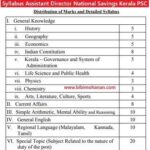Syllabus Lecturer in Architecture Polytechnic: DETAILED SYLLABUS FOR THE POST OF LECTURER IN ARCHITECTURE (GOVT.POLYTECHNICS) IN TECHNICAL EDUCATION DEPARTMENT
Join My Notebook Whatsapp Channel
CAT NO:003/2024
003/2024 syllabus Kerala PSC
Module I: Architectural Principles, Philosophies and Theories (15 marks)
Fundamental principles of architecture, principles of composition,
principles of visual design and visual perception, analyzing
architecture: architectural grammar, styles and aesthetic
components, creativity and meaning in design and design process,
vernacular architectural forms and its cultural geography,
architecture and society, Sustainable Design Principles, Biophilic
Design, Cultural and Contextual Design, Ethics in Architecture,
Adaptive Reuse and Conservation, modern and postmodern sociocultural movements in architecture and related theories, works of
master Architects and their philosophy, Emerging Trends in
Architectural Theory.
Module II: History of Architecture and Cultural Anthropology (10 marks)
Architecture during early cultures, paleolithic and neolithic period,
settlements of pre-historic civilization, river valley cultures, preclassical civilizations, early Christian, byzantine, Romanesque and
gothic architecture, renaissance architecture, Indian architecture:
Buddhist and Hindu period, Dravidian and Indo-Aryan architecture,
Islamic architecture: imperial, provincial and Mughal period, colonial
architecture, impact of industrial revolution, arts and crafts
movement, modern architecture, Chicago school, Bauhaus school
and isms in architecture, International style, post modernism,
deconstruction, critical regionalism, architecture in the globalized
world, Kerala Architecture: vernacular and traditional domestic,
religious and cultural architecture, works of renowned national and
international architects.
Module III: Architectural Design and Practice (5 marks)
Basic parameters of design, anthropometric studies, built
environment and space standards, architectural elements,
integration of form and function, residential typologies, environment
behavior and design needs, site planning and context studies, site
services and circulation systems, design standards, set back rules,
coverage, campus planning, barrier free design, contemporary
developments in architecture design and practice, building
information system, Principles of universal design, Designing for
inclusivity and accessibility.
Architect Act and Council of Architecture regulations in professional
practice and Architectural education, professional charges, tenders
and contracts, valuation and arbitration, laws and legislation related
to Architectural practice, Professional responsibilities and conduct,
role of development authorities and LSGI’s, current building
regulations and safety standards, FAR, FSI, density, occupancy
groups, parking standards, rainwater harvesting, energy
conservation and green building regulations, harmonized, guidelines
and standards for universal accessibility.
Module IV: Building Construction and Project Management (10 marks)
Building materials and fundamentals of building construction,
traditional and vernacular construction practices, construction of:
foundations, super structure, door and window systems, wall and
floor systems, roof systems, vertical transportation systems etc.,
advanced structural components and its construction technology,
modular construction, BIS specifications, cost effective technology,
sustainable construction practices, architectural acoustics, building
estimation, specification and budgeting, valuation of properties,
concept of disaster preparedness, mitigation and management,
disaster resilient construction techniques, Introduction to BIM
Implementation and management of BIM in construction projects,
Quality control processes in construction, Techniques and
technologies for prefabrication,
Project management techniques (CPM, PERT), contracts and
tenders, construction scheduling systems, project management
information systems, Types of construction contracts, Legal aspects
and dispute resolution in construction contracts
Module V: Building Services and Structural Systems (10 marks)
Water supply and plumbing system, sanitation, sewerage and
drainage system, liquid and solid waste management, water
treatment, water harvesting, wastewater treatment, industrial and
hazardous waste treatment and disposal, electrical services and
illumination, ventilation and air conditioning, firefighting, building
safety and security, services in high rise buildings. Smart building
technologies, IoT.
Structural behavior of various building materials, types of load
bearing structures, basic concepts of structural systems, stress and
strain behaviors of steel and concrete, structural properties of
columns and beams, cantilevered structures, design of structural
elements in wood, steel and RCC, principles of pre-stressing,
construction of tall building, structural properties of retaining walls
and foundations, earthquake resistant structures, advanced
construction technology, Maintenance and repair strategies for
aging structures.
Module VI: Landscape Planning and Design (10 marks)
Landscape Architecture and its relevance, human relationship with
nature and its evolution over time, contemporary attitudes to nature
and natural systems, ecological and cultural resources, site planning
philosophy, site development processes, elements and principles of
landscape design, landscape engineering, landscape construction
techniques, urban landscape and ecological planning principles and
processes, landscape urbanism, contemporary developments trends
in ecological urbanism, Water Management in Landscape Design,
Understanding and designing cultural landscapes, Principles of
designing public parks and recreational areas, Community
engagement in landscape planning, Climate-Responsive
Landscaping, Designing landscapes for different climate zones.
Module VII: Climate and Environment Design (15 marks)
Climate and built form, elements of climate, micro and macro
climate, climate and human comfort, thermal comfort indices, heat
flow through buildings, heat transfer performances of different
materials, solar systems and shading devices, natural ventilation
and wind movement, day light and lighting, active and passive
systems, renewable energy and its applications, climate responsive
design in various tropical climates, energy modelling and energy
conscious design, climate adaptation in contemporary architecture.
Building Envelopes and Facades,Design and performance of building
envelopes.
Fundamentals of ecology, ecological processes and principles,
environment and human behavior, behavioral theories,
environmental planning and environmental design principles,
environmental legislation and regulations, Environment Impact
Assessment (EIA), environment and climate summits, green building
standards and certification systems, urban climatology, climate
change and natural disasters, tropical urbanism and climate
sensitive design, blue-green infrastructure and eco-cities, carbon
neutral concepts and net zero cities. Urban Heat Island Effect, Life
Cycle Assessment (LCA), Methods for conducting LCA in building
design, Strategies for reducing the environmental impact of
buildings, Indoor Environmental Quality (IEQ), Factors affecting IEQ,
Design strategies for improving air quality, lighting, and acoustics.
Module VIII: Human Habitats and Development Theories (5 marks)
Evolution of human habitats, types of human settlements,
settlement pattern, urbanism and urbanization theories, patterns
and trends in Indian urbanization, urban culture and urban society,
housing, housing policies and finance, slums and urban poverty,
habitat conferences, rural development planning, rural-urban
(r’urban) developments.
Planning history and planning theories, pre-industrial and postindustrial cities, post-colonial and postmodern cities, urban growth
theories, globalization and urban development, economic
development models, contemporary urban development trends,
sustainable development: theories, concepts and approaches,
inclusive urban development. smart urban growth strategies.
Module IX: Urban Planning and Urban Design (10 marks)
Urban planning techniques, national and local development
planning institutions, planning legislation and governance
mechanisms, infrastructure development, traffic and transportation
planning, urban systems management, development economics,
development management, institutional mechanisms for
development planning and implementation, regional planning and
resource development, planning for tourism, poverty alleviation and
slum upgradation schemes, national policies and programs for urban
development.
Principles of urban design, urban processes shaping cities, urban
form and urban space theories, urban patterns, modern and postmodern urbanism theories, urban renewal and redevelopment,
ecosystem services and ecological restoration, social justice in
cities, neighborhood design principles, new urbanism, transit
oriented development (TOD) principles, participatory design
processes, national and international heritage conservation policies,
urban conservation, resilient cities and healthy city concepts.
Environmental Impact Assessment (EIA), Importance of EIA in urban
planning, Urban Data and GIS, Use of Geographic Information
Systems (GIS) in urban planning , Role of urban data in decisionmaking processes.
Module X: Advanced Research Methods, Contemporary Practices and Innovation in Architecture (10 marks)
Comprehensive research techniques, encompassing both qualitative
and quantitative methods, data analysis, and case study research,
cutting-edge technologies, advanced materials, and novel
construction methods such as smart buildings, parametric design,
3D printing, and sustainable practices, interdisciplinary approach,
integrating insights from computer science, engineering,
environmental science, and social sciences to address multifaceted
architectural challenges, participatory design processes,
Download PDF
- [PDF] Syllabus Law Officer Kerala State Co-operative Societies|192/2025 syllabus Kerala PSC
- [PDF] Syllabus Assistant Manager Kerala Welfare Fund Board KWFB| 433/2024 syllabus Kerala PSC
- Padma Awards 2026|Padma Vibhushan Awards 2026|Padma Bhushan Awards 2026|Padma Shri Awards 2026
- [PDF]Syllabus Assistant Director National Savings Kerala PSC|698/2025 Syllabus Kerala PSC
- [PDF] Syllabus HST Hindi|134/2025 syllabus Kerala PSC

